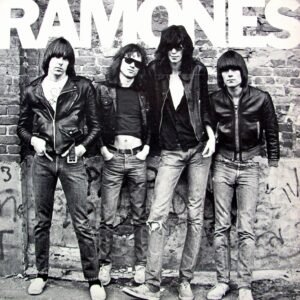Sheena Had Faith In Being A Pop Punk Rocker — Can Pop Punk Be Positive? A Discursive Reading
The Ramones, “Sheena Is A Punk Rocker” (official video), Rocket To Russia,1977.
It’s that season, Comic-Con. I continue to get email advertisements seeking my attendance to this iconic subcultural event. I’m not even a fan of comics, fantasy, or other relations within this cultural sphere. Yet, my limited attention to these items does not prevent the Comic-Con publicist from sending me warm emails inviting me to join the festivities. Not that I could ever see myself attending such an event, but, in contrast, what these emails did do was make me think about how alternative Comic-Con started, and yet how popular it has become. With Comic-Con’s punky subcultural origins I was drawn to recount origins of another punky subculture, punk rock. Thinking through punk rock’s dramatic history my thoughts gravitated toward a specific branch of punk rock — pop punk. This minor mental detour led me to question, “can pop punk be positive?”
Nebens, Richard. Comic-Con, July 20, 2023. https://thedirect.com/article/comic-con-2023-schedule-when-time-movie-tv-gaming-panels
Punk, as a cultural expression, has the stereotypes of being anti-social, rebellious, often aggressive and a negative discursive agent for a subcultural identity. But are these the only signifiers of punk that apply? Is punk really that limited? Is it possible for punk to be influenced by, and contain a positive faith-centered objective? It may be a surprise to some that the answer to each of these rhetorical questions is a dynamic, “yes.” Following this dialectic agenda, I had to listen — again — to the godfathers of punk, The Ramones. Who better to serve as a megaphone for punk — at the origins of the punk culture, than a band who established themselves at the epicenter of punk and have gone on to be synonymous with the term itself, “punk rock”. Fast, short songs, the model uniform (black leather jackets, cut-up jeans, black t-shirts), and song titles that had the hooks built right-in. Yes, The Ramones clearly cast the definition of what punk was in the 1970s and through to this day (c. 2023).
The Ramones, IMdB. https://www.imdb.com/name/nm0708506/
The founding image and voice of the band, Joey Ramone, had some interesting views about pop and surf music during the dawning days of the punk movement. Joey Ramon’s deep infatuation with surf music and bubblegum pop of the 1960s led to aid in the creation of punk anthems that still ring loud and surprisingly clear today. But were these elements and inspirations too easily overlooked by music journalists, pop musicologists, and fans alike? Again, the answer to these rhetorical questions comes as a surprised, “yes.” Taking that absent lead, set in motion by Joey Ramone, I began to wonder, research, and listen to the prophetic 1977 song, Sheena is a Punk Rocker. This central track to the 1977 Rocket To Russia record, is the kernel of how a punk song was to be formed, produced, expressed. Simple lyrics, short verses, no extra guitar solos, and a hypnotic hook, Sheena started as a punk troupe, but found itself embedded within the hallowed halls of punk history. Given all this context, how does this track, Sheena, outline or draw attention to faith in punk? That’s where the fun begins.
Sheena Is A Punk Rocker, cover, 1977. https://www.discogs.com/fr/release/3307050-Ramones-Shes-The-One-Sheena-Is-A-Punk-Rocker/image/SW1hZ2U6NzIyODQ1Mw==
In 1937/1938, Sheena, Queen of the Jungle, a fictional comic character who is a female counterpoint to Tarzan, King of the Jungle, makes her global debut. Equipped with abilities to weave various weapons and enduring the untamed jungle landscapes of Africa, Sheena caught the attention of young comic fans at the time (and had a resurgence in 2007).
Unbeknownst to comic and rock fans alike in the late 1960s/early 1970s, this hypersexualized feminine character was to become the main character in the Ramones song, Sheena is a Punk Rocker. Joey Ramone’s interest in the comic led him to contemplate what Sheena might consider about punk rock. In Joey Ramone’s opinion, Sheena would be a fan, hence the birth of the song title and forthcoming iconic track. Signifying with the developing aesthetics of punk, laced with the sounds of surf and bubblegum pop at the time, The Ramones recorded the song, Sheena, which they coined as the first surf/pop punk song. It’s this positive punk action which rebels against the negative image of punk’s youthful years. It was Joey Ramone himself who said, in a 1988 interview that The Ramones were always a positive band (Harris 1988).
A GQ article in 2020 notes that, “The Ramones took positive[ity]…to a whole new level (Jones 2020)”. Jone’s article continues that The Ramones, “were too postmodern [when they first arrived on the punk scene]…but then at the time the world appeared to be crying out for postmodernism, especially in the music world (Jones 2020)”. To further exemplify this point, Bono — of U2 fame — notes that U2 was formed around the “idea of friendship and shared spirit.. [t]hat was a preposterous notion before the Ramones (Jones 2020)”. Following this trajectory, it is not a far stretch to see how the origins of a faith-based pop punk vernacular could be developed and progress going forward following the undercurrent lead The Ramones did and did not speak of nor draw attention.
Positive punk bands — those aligned with a faith-based centrist value — contextualize their faith within the socio-pop linguistics of pop punk c. 1980/90s California/West Coast surf/pop style. This activation does not reduce the intrinsic faith of the bands, nor their use of punk as a signifier, but rather provides a fruitful platform through which these bands communicate, articulate, produce, develop, and expand the core of their faith.
This pop faith-based punk genre obfuscates the otherwise noted “positive punk” genre which musicologist have recognized as being the forerunner of the goth, emo, and shoegazer genres (NME 1983). Avoiding the pitfalls of a negative punk image, that has become a social stereotype in witness to a general essentialist viewpoint of punk being an anti-social, operating outside assumed cultural norms and in objection to being labeled or reduced to a status quo. The pop punk direction is self-explanatory, “a subgenre of punk utilizing pop culture icons and signifiers.” This conversive angle embraced by pop punk bands allows for the investment of faith within an expressive discourse operating and communicating beyond assumed negative signifiers of punk. A voice in faith, a sound in pop punk, a directive positive agency for audience recognition become the outliners for faith-based punk. There is no shame, no veiled rhetoric, no metaphorical twist or turns for positive faith-based punk bands to express their faith. The fluidity and dynamics of the punk expressive vernacular are fully and creatively embraced. The socio-linguistic realities of punk are re-presented through a positive lens to display — on a growing contemporary platform — the necessity for such faith-based punk sounds to help draw attention to current issues facing younger audiences and their balance of social pressures with core faith values.
Faith-based punk bands continue to outsell other “authentic” or “pure” punk bands and genres (2023). Electing not to be limited to the acceptance from the scripted stereotypes of the punk genre, faith-based punk situates itself in a counter antisocial perspective — functioning outside perceived historic punk norms. This methodology allows faith-based punk groups to operate freely of the punk industry mechanics, focus on positive actions to issues facing their audiences, and fortify their own faith through the binary agency of punk vernacular and core faith expression. Founding bands such as Squad Five-O, Slick Shoes, Dogwood and Pocket Change helped pave the road for other bands such as Relient K, FM Static, Flatfoot 56 and This Providence, to speak toward, encourage, and develop a punk expressive situated in faith, positive action for their communities, and location of contemporary culture.
Relevant, 1 September, 2022 https://relevantmagazine.com/culture/music/just-25-songs-from-christian-bands-that-are-still-pretty-great/
Joey Ramone turns out to be more than just the noted “godfather of punk (Jones 2020)”. He was a prophetic when it came to the direction of positive punk. It may appear complicated to see how, back in 1976/1977 that a punk band from the alternative outsider music scene in New York would steer the course of where punk was to go in the coming decades. Yet, by relying upon his belief in being different, Joey Ramones and his fellow bandmates were able to see beyond their personal/political differences and define a clear path that would eventually lead the future of faith-based punk bands to see how possible it is to remain dedicated to their beliefs, appropriate pop punk signifiers and re-present a punk dialectic centered upon positive image, identity, and faith.
As stated earlier, most musicologist and journalist see the trajectory of the positive punk genre as a subgenre of the punk cannon, a predecessor to other subgenres of punk that bridge together fringe rock expressions. This review is not entirely incorrect, but does avoid other popular directions for punk, that are not subservient to any sonic hierarchy. Yes, positive faith-based punk brings attention to a side of punk that may look like an oxymoron, but is more commercially successful, thriving for a global audience, and secure within its own sounding sphere of influence built on faith, positive image, and The Ramones “be yourself” model.
Visit the Blood Sweat Pray Store





